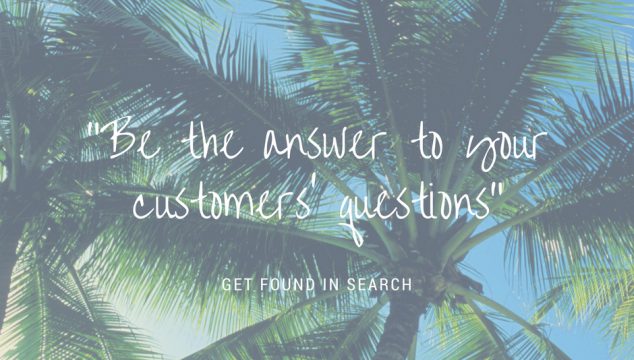
When you need to find information, where do you look?
If your answer was Google, you are not alone. Here is a staggering statistic: Google now processes over 40,000 search queries every second, or over 3.5 billion searches per day. [Source]
We like having information at our fingertips. Between search, voice assistants like Google Now, Siri and Alexa, and the rise of smartphones, the buying process has radically changed. Consumers and business purchasers research and self-educate prior to stepping foot in a store or calling a salesperson. When was the last time you looked up something online when considering a purchase? How many times a day do you that? Forrester research suggests that by 2020, more than 80% of the buying process will occur without any direct human-to-human interaction.
How Does this Affect Your Business?
One thing to understand is that better technology has made search more conversational. Search terms are getting longer. Also called long-tail keywords, very specific phrases are becoming the norm. One estimate puts long-tail keywords at over 70% of searches.
It’s more common to see a search like “cute women’s winter down jacket for work” than “jacket” or “women’s jacket.” When searching we no longer type or speak single words or awkward phrases, but use conversational terms. Instead of “water heater” you get “replace leaking gas water heater with energy efficient model” or “who to call to replace water heater.”
If your website lists all your services or products on a single page with a line or two about each, you aren’t likely to appear in search for any of the terms. Your content needs to be presented with detail and relevance. Writing frequent blog posts talking about work you’ve done, using portfolios, case studies, product tips and reviews, and sharing consistently to social media channels will help your search efforts. You might want to look at Shopify’s tips as an example of how to write good descriptive content for your products and services. Google’s goal is to show the most relevant answer to any search query. If you didn’t get the answer you were looking for when you entered a Google search, you’d try and find a different search engine.
What Kind of Content Should I Create?
It’s simple really. You have to be the answer to the questions people are typing into the search engine. To rank well, your content must be relevant and there must be enough detail for the search engine to decide that a page or post on your site is the answer the searcher is looking for.
Content that addresses these long-tail keywords may not attract as much search volume, but the traffic you do get will be more likely to convert into actual business. [Source]
When planning your content strategy it is best to think in terms of user intent.
Where is the Customer in the Buying Process?
Customers have different questions and information requirements depending on where they are in the buying process.
- Awareness and Education: Customers may or may not be aware of your product or service. They see they have a need to fulfill or a problem to solve.
- Evaluation: Customers are aware that your product or service could fulfill their need, and they are trying to see if you will be their best choice.
- Decision / Purchase: Customers are ready to make a purchase.
- Experience: What is the experience of doing business with you like? Will customers become advocates for you?
Use this information to create a map that will identify the natural customer requirements for each stage, then create content that will answer questions that arise at each one.
What is Local to the Customer?
If you are targeting a specific geographic area on your website, do you have content for that area? This does not mean simply listing out the cities or areas you service.
Maps drive a lot of local search, and “near me” searches are one of the fastest growing search phrases. For this reason, it is critical that you claim your local business listing, and get on the map.
This is not sufficient however, and you should create content that shows you are part of the local community. You can’t expect to rank for a neighboring community if you never mention the town’s name anywhere on your website.
What Words Do Customers Use?
If you use certain industry terms, make sure they are the same terms your customers use as well. If a potential customer is searching for, “painter in my area,” but you describe yourself as an “artistic color consultant,” your website is not likely to rank well for that customer’s query. Think like your customer and use the terminology they are most comfortable with.
If your aren’t sure what you will say, think about what customers want to know about your products, services, industry and processes. Think about what content you are already conveying to your customers; you probably have more than you think. You may have heard me say, “if you’ve told it to three or more people, it belongs on your website.” Content should be interesting, focused on the hottest topics, and evaluated for potential sharing.
Have fun with it, tell your story online.

